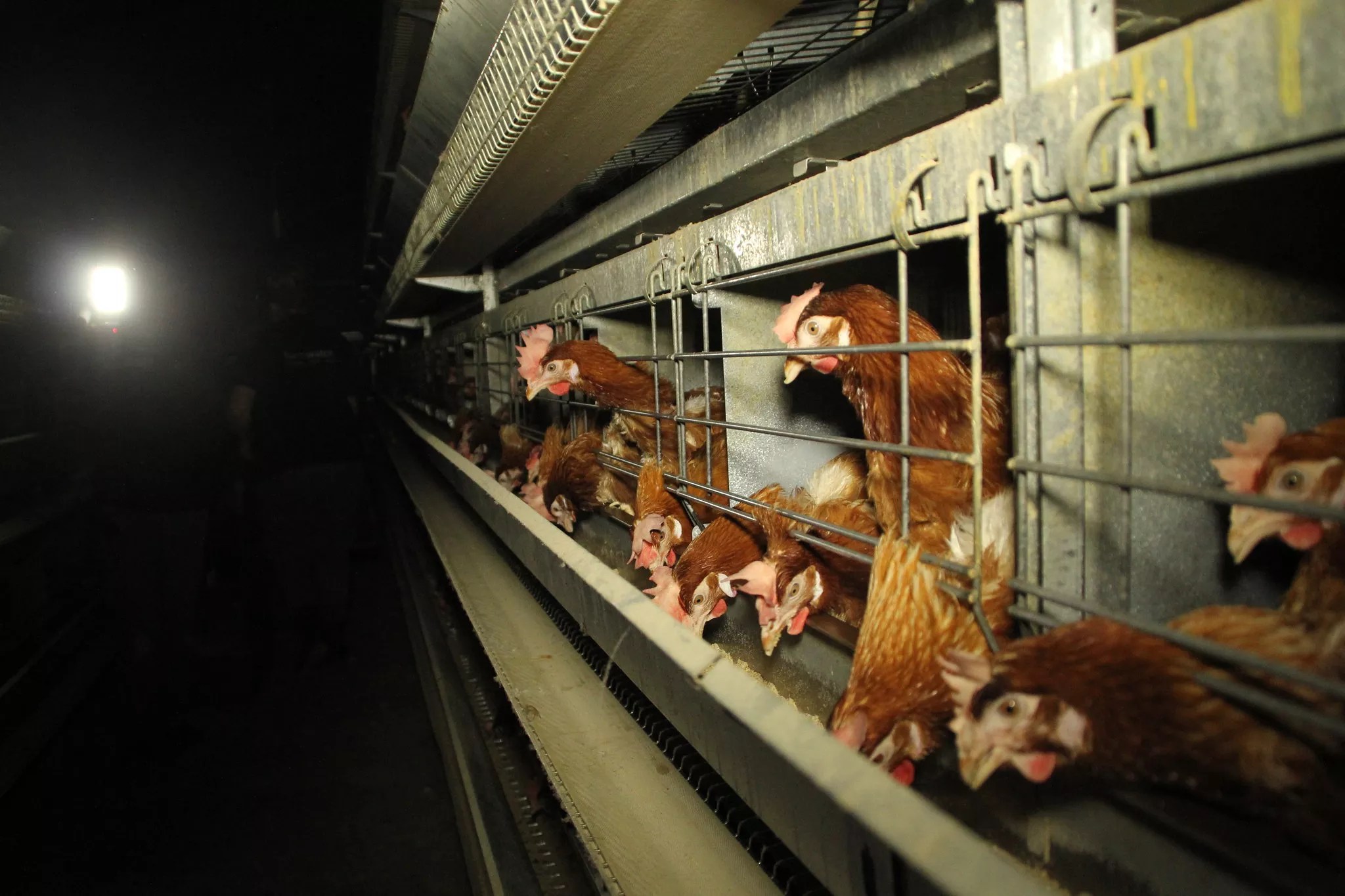

Audio By Carbonatix
A new kind of freedom is on the horizon, for the hens of Arizona.
If an industry-backed bill passes the Legislature, the state could ban the sale of all eggs laid by confined or caged hens, starting in 2025.
HB 2724, introduced by Representative Timothy Dunn, a grain farmer from Yuma, puts Arizona on a growing list of states that have passed or are considering such mandates amid rising pressure to produce eggs laid by humanely treated hens.
According to Dunn, the bill represents a compromise between Arizona’s egg industry, which is dominated by Hickman’s Family Farms, and the Humane Society of the United States, which advocates for the humane treatment of animals.
Hickman’s approached him and asked him to run the bill on their behalf, Dunn said, because “they have negotiated something that they believe they can live with, to stay in business.” He said the requirements laid out in the bill were “100 percent” from Hickman’s compromise with the Humane Society.
The Humane Society did not respond to a request for comment for this piece. Neither did Billy Hickman, the egg farm’s vice president of operations.
According to Dunn, the bill would cost Hickman’s several hundred million dollars, a necessary investment to allow them to continue selling eggs in California, where a law limiting animal confinement took effect in 2015.
“We call it … the Hickman compromise bill,” said Dunn.
The bill has not yet had a first read on the House floor, but Dunn said that it was “definitely a priority because the Hickmans want to get it done,” despite opposition from others in the agricultural industry. Dunn, whose extensive district includes Hickman’s farms, chairs the House Land and Agriculture Committee.
“We call it … the Hickman compromise bill.” — Arizona State Representative Timothy Dunn
The proposed legislation would require egg producers to start giving hens more space by the end of this year. From December 31, 2020, industrial egg farms would not be allowed to confine hens to any area smaller than one square foot per hen.
Four years after that, starting December 31, 2024, egg factories in Arizona would be barred from confining laying hens to cages at all. Instead, they would need to give each hen at least one square foot of “usable floor space” in a multilevel aviary, or one and a half square feet of such space in a single-level system.
Businesses in the state would also be barred from purchasing eggs from any farm that fails to meet those requirements.
Considering how egg-makers – that is, hens – in the United States are mostly crammed into wire shoeboxes known as battery cages, a little more breathing room might not seem like a bad thing, although some studies have suggested that freeing hens from their cages can introduce a spate of new problems. Free-moving hens tend to spread more germs and could become more aggressive – even cannabalistic – research has shown.
Still, battery cages give hens about 67 square inches per bird, roughly equivalent to a letter-sized piece of paper and not even half of the 144 square inches proposed in the bill. In those cages, chickens can’t behave like chickens. They can’t scratch in the dirt and hunt for bugs, or take dust baths. They can’t perch or spread their wings.
“No one’s going to claim chickens are brilliant, but they are sentient beings,” said Joyce Tischler, a professor of animal law at Lewis & Clark Law School in Portland, Oregon, and a co-founder of the Animal Legal Defense Fund. “They suffer in these battery cages.”

Representative Timothy Dunn.
According to Tischler, 95 percent of egg-laying hens today are in massive factory-like facilities, and the public is largely unaware of the extent to which agriculture – eggs included – has been cruelly industrialized.
While a ban on cages and confinement would be an improvement for the hens’ well-being, hens need more than just increased floor space to be considered humanely treated, she added.
Even in a cage-free system, they would still be housed in a massive warehouse with putrid air, Tischler said. The bill wouldn’t address cruel practices like forced molting, which is used to increase egg production, she added.
“The level of improvement is going to depend upon the individuals who are raising those chickens,” she explained. “The question becomes, How much better is life going to get for those hens?”
Dunn, the bill’s sponsor, questioned the value of switching to a cage-free system, calling it a “feel-good practice” that wasn’t based on sound science and that would raise costs for customers.
As someone with an agricultural background, he added, he was very proud of the science and technology that the industry uses to raise animals, and he said that groups like the Humane Society falsely cast those practices as unfair to animals.
“There’s nothing to that,” he said of such claims, saying that confined feeding operations are “best science.”
According to research by the U.S. Centers for Disease Control and Prevention, the growth of such operations “has led to growing environmental problems” and have a “direct impact on human health and welfare for communities that contain large industrial farms.” Other research has shed led on the inhumane treatment of animals kept in these operations, prompting consumers and retailers alike to demand better conditions.
Other agricultural groups are “not happy” with the Hickman-backed bill, Dunn said, because they fear it will lead to similar changes in the industry at large.
“I have more pressure not to run the bill,” he added. “We don’t want this kind of legislation to inspire other legislation” that would affect feedlots or “the next confined animal feeding operation.”
Despite his opposition to elements of his own bill, Dunn said it was better that he be the one to carry it to the finish line, so that he could control it. The bill represents what the Hickmans want, he said, and he preferred to pass that language than to watch the proposed changes go to a ballot initiative.
State campaign finance filings show that members of the Hickman family gave $3,505 to Dunn during his 2018 campaign, out of roughly $137,000 donated to him that season. Other agricultural groups, like the Arizona Cattlemen’s Association, individual farmers and ranchers, and staunch supporters like the Aja family also contributed to Dunn’s campaign.
Dunn said that the donations from various Hickmans were “kind of irrelevant” to the bill, because he probably had “donations from every ag person in the state that’s interested in politics.”
“How much better is life going to get for those hens?” — Joyce Tischler, professor of animal law
According to the U.S. Department of Agriculture, Arizona has 984 poultry and egg farms. Available data don’t show how many are egg producers, or how big those facilities are.
The majority of those farms are probably small poultry operations, said Julie Murphree, spokesperson for the Arizona Farm Bureau. The two “significant” commercial egg farms are Hickman’s and Rose Acre Farms, she added.
Both those companies have facilities that house millions of egg-laying hens.
Hickman’s, one of the 20 largest egg producers in the country, has some 9 million hens in massive barns in Arlington, Tonopah, and Maricopa producing nearly 2 billion eggs per year.
In 2016, Hickman’s began going cage-free in some of those barns, the Arizona Republic reported in 2017. Part of the reason for the shift was the change in California law in 2015.
“For us, we can say we are not going to do it, and then have no customers left,” Clint Hickman, the company’s vice president of sales, who also serves on the Maricopa County Board of Supervisors, told the Republic at the time.
Indiana-based Rose Acre Farms, the second-largest egg producer in the country, has one facility in Arizona, in La Paz County, with 2 million hens.
Clay Brown, a spokesperson for Rose Acre Farms, said that the company didn’t have a stance on the bill, “considering that our operations in Arizona are already cage-free.”
“It’s not really affecting us,” he said.